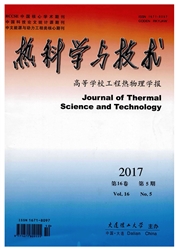

 中文摘要:
中文摘要:
针对燃料电池汽车余热驱动的吸附式制冷循环过程吸、脱附特性,采用动态的分析方法,对吸附式制冷系统的主要部件吸附床在不同阶段(等容加热、等压解吸、等容冷却、等压吸附)的工作过程,分别建立了动态方程,并就其制冷系统的蒸发器及冷凝器建立相应的动态方程。利用数值方法对数学模型进行求解.全面而系统地分析了循环周期、热源温度、外界空气温度、空调回风温度以及冷却水进口温度等参数对系统性能的影响。研究结果表明:随着循环周期的延长,单位质量吸附剂制冷功率值存在一个峰值.热源温度的提高、外界空气温度的降低、空调回风温度的升高、冷却水进口温度的降低等均有助于提高吸附式空调系统的性能。
 英文摘要:
英文摘要:
Dynamic analytical method was applied for the study of the adsorption refrigeration cycle driving by waste heat of fuel cell electrical vehicle. Dynamic equations for adsorption bed for different phases (heating for specific votume to fix, desorbing for pressure to fix, cooling for specific votume to fix and adsorbing for pressure to fix), and the dynamic equations for evaporator and condenser were developed. Mathematical models were solved by numerical method. The influence of the circulating cycle, temperature of heat source,temperature of ambient air,temperature of air return, temperature of cooling water upon the system performance was discussed. It indicates that SCP value exists a peak value along with the extension of the circulating period. A rise of the temperature of heat source and the temperature of air return, and a decrease of the temperature of ambient air and the temperature of cooling water, may improve the performance of adsorption air-conditioning system.
 同期刊论文项目
同期刊论文项目
 同项目期刊论文
同项目期刊论文
 期刊信息
期刊信息
